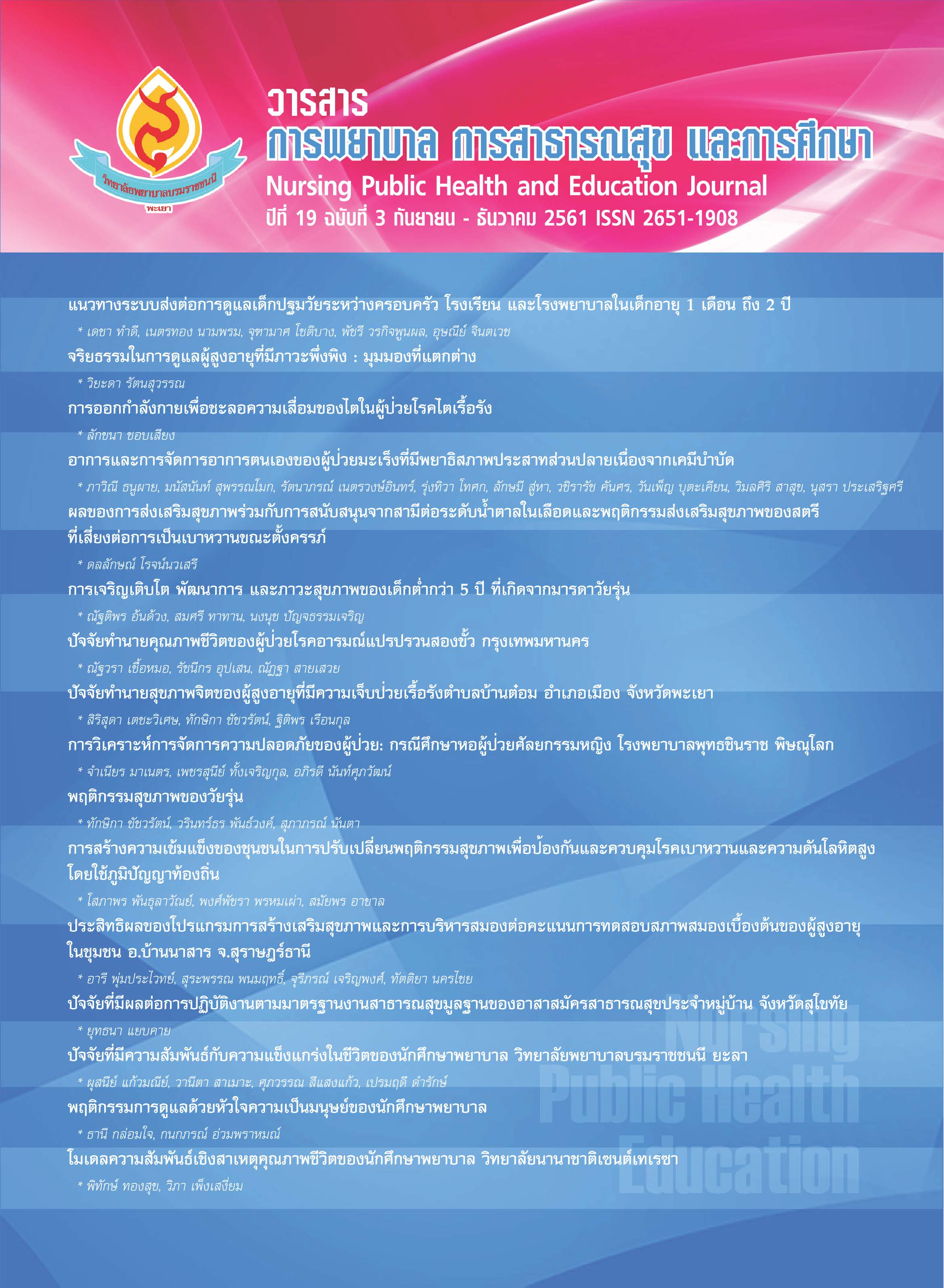อาการและการจัดการอาการตนเองของผู้ป่วยมะเร็งที่มีพยาธิสภาพประสาทส่วนปลาย เนื่องจากเคมีบำบัด
Keywords:
เหตุพยาธิสภาพประสาทส่วนปลาย, มะเร็ง, เคมีบำบัด, การจัดการอาการตนเอง, CIPN, Cancer, Chemotherapy, Self-ManagementAbstract
พยาธิสภาพประสาทส่วนปลายเนื่องจากเคมีบำบัด (Chemotherapy-Induced Peripheral Neuropathy (CIPN)) ส่งผลต่อคุณภาพชีวิตผู้ป่วย ยังมีข้อมูลจำกัดเกี่ยวกับอาการและการจัดการอาการด้วยตนเองในผู้ป่วย CIPN การวิจัยเชิงพรรณนานี้ มีวัตถุประสงค์เพื่อศึกษาอาการและการจัดการอาการ CIPN ด้วยตนเอง กลุ่มตัวอย่างเป็นผู้ป่วยมะเร็งจำนวน 104 คน ที่ได้รับการรักษาด้วยเคมีบำบัดในโรงพยาบาลมะเร็งอุบลราชธานี ระหว่าง เดือน ตุลาคม ถึง พฤศจิกายน 2560 เกณฑ์คัดเข้ากลุ่มตัวอย่างเป็นผู้ป่วยมะเร็ง อายุมากกว่า 18 ปี ทุกระยะของโรคมะเร็ง และได้รับการรักษาด้วยเคมีบำบัด 5 กลุ่ม ได้แก่ Platinum, Taxanes Vinca alkaloids, Antiangiogenic agent และ Proteasome inhibitor เก็บรวบรวมข้อมูลโดยใช้แบบประเมิน EORTC QLQ – CIPN20 และแบบสอบถามการจัดการอาการ CIPN ด้วยตนเอง วิเคราะห์ข้อมูลเชิงปริมาณโดยใช้สถิติเชิงพรรณนา
ผลการวิจัยพบว่าผู้ป่วยมีอาการ CIPN ด้านประสาทรับความรู้สึกพบ ร้อยละ 21.8-57 และมีอาการชามากที่สุด อาการประสาทการเคลื่อนไหว ร้อยละ 13.3-34 อาการกล้ามเนื้ออ่อนแรงมากที่สุด และอาการระบบประสาทอัตโนมัติ ร้อยละ 21.1-40 อาการวิงเวียนมากที่สุด การจัดการอาการ CIPN ของผู้ป่วย พบว่าผู้ป่วยมีวิธีการจัดการอาการ CIPN แบ่งออกเป็น 3 ด้าน คือ ประสาทรับความรู้สึก มีการจัดการมากที่สุดด้วยวิธีการบีบ นวด กำแบ และใช้ยาหม่องนวด ตามลำดับ อาการประสาทการเคลื่อนไหว มีการจัดการมากที่สุดด้วย บีบ นวด และ วิธีการนั่งพัก และอาการระบบประสาทอัตโนมัติ มีการจัดการมากที่สุดด้วยวิธีนั่งพัก รับประทานยา ดมยาแก้วิงเวียน
การจัดการกับอาการ CIPN มีหลากหลายวิธี ทั้งการจัดการอาการโดยใช้ยาและไม่ใช้ยา ผู้ป่วยเกิดการเรียนรู้ที่จะจัดการกับอาการด้วยตนเอง เพื่อทำให้อาการที่เกิดขึ้นขณะนั้นหายไปหรือบรรเทาลง บุคลากรทางสุขภาพควรแนะนำวิธีการจัดการอาการในผู้ป่วย CIPN ที่ปลอดภัย เพื่อคุณภาพชีวิตที่ดีต่อไป
Symptoms and Self-Management Strategies for Chemotherapy-Induced Peripheral Neuropathy in Cancer Patientsฃ
Chemotherapy-Induced Peripheral Neuropathy (CIPN) effect on the patients’ quality of life. However, there is limitation study of self-management in CIPN patients. This descriptive research aimed to study CIPN and self-management of the symptoms of in cancer patients. We recruited cancer patients (N = 104) who were received chemotherapy in Ubon Ratchathani Cancer Hospital between October and November 2017. Eligible patients were ≥18 years of age with any stage of cancer and had received neurotoxic chemotherapy with 5 groups including (1) Platinum, (2) Taxanes, (3) Vinca alkaloids, (4) Antiangiogenic agent and (5) Proteasome inhibitor. Data were collected by using 1) EORTC QLQ – CIPN20, and 2) CIPN symptoms management strategies questionnaire. Data were analyzed by using descriptive statistics.
The results found that patients had problem of CIPN as the follow: sensory symptoms (21.8 -57%) the highest symptom was numbness, motor symptoms (13.3-34 %) the highest symptom was weakness, and autonomous symptoms (21.1-40 %) the highest symptom was dizziness. The patient had self-management strategies for CIPN that divided into 3 groups: sensory (squeeze, massage with balm, grip hands), motor (rest, stretch muscles, and walk) and autonomous (rest, take medicine, nasal inhaler).
Conclusion; the most common CIPN symptoms was sensory and self-management of CIPN symptoms were handled in various ways. Patients used use pharmacological and non- pharmacological strategies that they have learned by themselves to alleviate and relieve their CIPN symptoms. Health professionals should advice safety CIPN symptom management’s for better patient’s quality of life.


